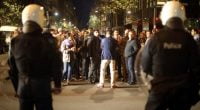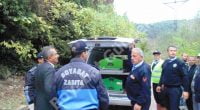Turkey’s greatest service to the Muslim world

Date posted: October 11, 2014
Turkey was a shining star during the years that it implemented democratic reforms internally and improved relations with other countries, particularly its neighbors. Both the West and the Muslim world were watching Turkey’s progress intently and its economic success and democratic transformation would be referred to as exemplary.
This appraisal, which was never imagined before, was the result of sympathy for Turkey’s policies. People with Islamic identities were at the helm of Turkey, but they were not pursuing Islamist goals. They were attaching importance not only to the relations with the Muslim world, but also to the country’s bid to become a full member of the European Union. When they looked at Turkey, foreigners saw not the Taliban’s Afghanistan or a country like Iran but a democratic, developed country which was self-confident and at peace with its identity and seeking to become a respected member of the modern world.
Not only the Arab media, but also Western media outlets were teeming with articles praising Turkey’s democratic transformation, dubbing it the “silent revolution.”
Turkey’s success was all the more significant in that it had come in the wake of the great shock from the Sept. 11 terrorist attacks which were claimed to be conducted in the name of Islam. This success was not the work only of politicians, but Turkish schools — which are run by Turkish entrepreneurs inspired by the ideas of well-respected Turkish Islamic scholar Fethullah Gülen — charitable organizations, Turkish soap operas and Turkish civil society had played their part. Major capitals were voicing the hope that Turkey’s modern, constructive and democratic interpretation of Islam would set an example for the entire Muslim world.
In my opinion, the biggest contribution Turkey made to the Muslim world which was suffering from dictatorship regimes, poverty and ignorance, and to the world which was in the grip of Islamophobia largely because of certain Islamic actors which obscured the luminous face of Islam — such as the Taliban, al-Qaeda and the Islamic State of Iraq and the Levant (ISIL) — was to set a good example in economics, rule of law, democracy, constructive diplomacy, human rights and anti-corruption, etc. This policy proved rewarding for the country as it boosted the country’s image both in the Muslim world and the West.
It would be better for everyone if we maintained this policy, but we were blinded by a premature arrogance. Then, we jettisoned the goal of using the EU criteria as a reference and benchmark, although those criteria were the main driving force for democratic transformation. We thought we had nothing to learn from them. We started to tell Europeans what they should do and even made fun of the economic crisis they were suffering from. We saw the Court of Accounts, which had been strengthened in the fight against corruption, as a nuisance and a stumbling block. Then the judiciary, which had been reformed in 2010, appeared to be a burden. We created pro-government media outlets and started to control others using taxes as punishment or assigning pro-government figures to manage them. The society was divided into “us and them.” Anyone who dared criticize these developments were labeled traitors, and dissident businessmen and bureaucrats were profiled.
In our domestic policies, we started to see ourselves as a regional and even global power that could regulate the region. Instead of humbly establishing good relations with all countries, we became a country that took sides or meddled in the domestic affairs of those countries, accompanied with overly assertive statements. For instance, we said that the Syrian crisis is one of our domestic issues. We wouldn’t allow the massacres of Hama and Homs in the 1980s to be repeated. The Baathist regime would fall in a couple of weeks. We would solve Iran’s nuclear issue. We would go to Gaza and put the Middle East into shape, acting as a strategic partner with Egypt.
But we ended up as follows: Bashar al-Assad is still in power. A total of 160,000 people died in Syria. Hama and Homs were demolished. Small terror states were established right next door. We have 2 million refugees. Our prestige in Egypt is zero. We have left Libya completely…
For an objective description of how we are performing at home, you may have a look at the latest EU Progress Report, which is concerned with press freedoms, fight against corruption, judicial independence, etc. Those who don’t trust Europeans may lend an ear to the following message by Constitutional Court President Haşim Kılıç, who prevented the closure of the ruling Justice and Development Party (AKP) back in 2008: “The ever-increasing hatred and hate speech in Turkey worries me. The resulting climate of fear affects journalists as well. We must fight for fundamental rights and freedoms. Journalists should resist. They should not give up.”
If we want to help ourselves and the Muslim world, it is obvious what we should do. We Muslims don’t need weapons or heroism, but rather a success story that combines democracy, justice, morality and welfare.
Source: Today's Zaman , October 10, 2014
Tags: Islamic World | Peacebuilding | Turkey |
























